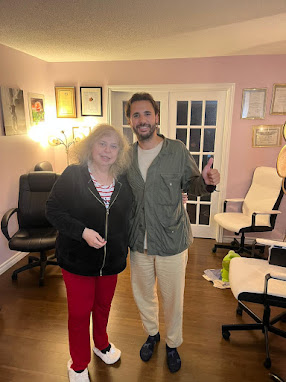Have you been a singer in the past, and had recently lost your voice? WE CAN HELP!!
I have more and more inquiries from people who used to sing for some time in the past; and suddenly, (or at least so they thought), lost their singing range and some of them even lost their singing voice altogether.
Now they are older and in their 40s (and counting), and they
still cannot get a grip on the notion that their love and joy of singing
might never be present again...?
Quite a few years later after the occurrence, they had been still
upset and even depressed about it. Of
course, they had been through numerous visits to doctors, speech therapists, pathologists and nevertheless many vocal coaches. However, in the majority of cases, it did not add up to any tangible, needless to say, expected
results.
With the above said, since they had lost their love and joy to be able to sing effortlessly and painlessly, their lives were never the same. Their passion and desire
for expressing themselves, (telling their stories and expressing their emotions through singing), had been
deeply buried.
- What would it take to recover one’s singing voice? Is it even possible?
- If it was possible, how would it impact the long-term voice sufferer’s life?
I, fortunately, could shed the light on all of the above:
To answer the first question; luckily, in the majority of cases,
it is absolutely possible. How does it happen that the singing voice, “all of a
sudden, disappears”, (so to speak), you may ask?
Some people are born with natural singing talent; and once
they discover it, they obviously begin to use it - and, basically, rightfully so. However, while enjoying their newly-found voice, they begin using it excessively. Thus, not being
aware of the proper voice application and vocal technique, they end up overusing it and, nevertheless, abusing
it to the “point of no return” - at least in the conventional sense.
For some reason, neither they nor their "mentors" realize that
the singers’ vocal cords are not made from steel. In fact, they are very
fragile and, thus have to be treated with special care. Like any instrument, the voice and, (for the record), the entire body, requires a frequent tune-up and, of course, proper maintenance.
Usually, the young and talented artists who get discovered via
their talents and looks have no idea how to power their voice without any pain
or strain on their vocal anatomy. So they pull and push their voices full
force. And one day, sooner or later, the voice “pops” so to speak. That is how one of my singing voice
repair clients had described it.
The musicians often use the expression, “No gig lasts
forever”.
Indeed! Nobody should take his or her voice, (or other parts of their anatomy for that matter), for granted. If you are entering any high-tasking
field, (singing performance included), please conduct proper research to the best of your knowledge and only then act accordingly. So please try to learn how NOT to kill your voice, but rather the opposite; how to preserve and
nurture your internal, nonetheless, fragile instrument – Your Voice!
With that said, keep in mind that recovering and restoring it to its original state would
take a great effort on the part of the singer and a very experienced voice
specialist.
To answer the second question, voice recovery and restoration is a huge deal and when it is complete, some people begin to
re-evaluate the purpose of their lives (past and present). Nonetheless, it
is, indeed, a little difficult to turn the internal clock back and now leave their present lives
trying to come back to something that was very precious in the past.
As we all know, there is no change without change, even if
it is a positive one.
However, in any case, the benefits of a newly-found voice are
countless:
- The confidence
- the self-esteem and self-worth
- the dignity
and integrity
- the pride of accomplishment...
- recovered the joy and
passion which was present in the past - before their voice injury...
Is there "a price tag" you could put on that...?!
.png)



Comments
Post a Comment